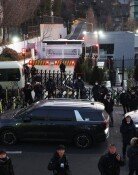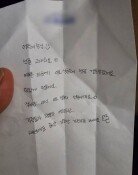Presidential Security Service Drops General Officer Rank from Its Leadership Post
Presidential Security Service Drops General Officer Rank from Its Leadership Post
Posted July. 04, 2005 03:12,
The Presidential Security Service has erased the last remnant of military culture.
Until now, the status of the chief presidential guard was stipulated as a parliamentary minister, vice-minister or general-level officer in the enforcement ordinance of the Presidential Security Service (PSS). The part of general-level officer was recently deleted through voting in a cabinet meeting. The new ordinance came into effect after President Roh Moo-hyun signed it on June 30.
The erased article was inserted right after the neo-militarists came into power and revised the law regarding the PSS through a legislation meeting of the national preservation committee in January 1981. It was the intention of the neo-militarists to hold sway over the PSS legitimately by letting a general on the active list to assume the position of chief presidential guard.
The article saying [a president] may appoint officers on active duty, if necessary, to deputy chief of the presidential guard and staff was also inserted then, and was deleted on this occasion, too.
Jeong Dong-ho, who served as the fourth chief presidential guard after the October 26 crisis in 1979 for a year and seven months, is the only case in which a general on active duty assumed the position of chief of the presidential guard. Since its establishment in 1963, however, most chief presidential guards were reserve generals, and thus the position was considered as an exclusive possession of those in the military clique.
With the appointment of a former regular presidential guard, Park Sang-bum, to the ninth chief presidential guard for the first time in the Kim Young-sam administration, the signal gun for civilianization was shot in the PSS. President Roh also appointed Kim Se-ok, who was a former chief of the Korean National Police Agency, thinking of civilianization of the PSS.
Nonetheless, since a cooperative relationship with the military is indispensable considering the characteristics of escort tasks, there are about 10 military officers, including two colonels, on active duty dispatched to the PSS. There are more than a few presidential guards among those who joined the PSS through open employment that were former ROTC officers.
Meanwhile, according to the regulation that the PSS is in charge of former ex-presidents for seven years after they leave office, the PSS transferred the task of escorting former President Kim Young-sam to the Korean National Police Agency as of February 24, 2005.
Jung-Hun Kim jnghn@donga.com







